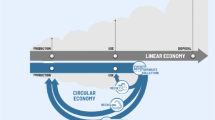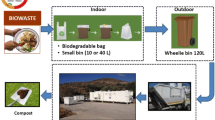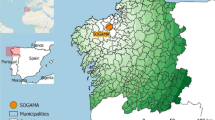Abstract
Nowadays, composting technologies are being used to manage food waste (FW), which is an environmentally friendly method of waste management in which organic matter can decompose biologically. The BIOWASTE project promotes the transfer and application testing of innovative technologies (PAYT and ACUs), aiming to enhance management efficiency in solid waste-related issues, such as source separation schemes and treatment systems emphasizing organic waste. The proposed systems were introduced in the Municipality of Katerini. Ιn the framework of the BIOWASTE project, the Municipality of Katerini developed a detailed pay-as-you throw (PAYT) system and installed two Autonomous Composting Units (ACUs) in decentralized communities to receive the biowaste produced directly without the need for collection. ACUs are small closed integrated composting units that neutralize effluent and expanding liquids. The aim of this paper is to present the results of a case study dealing with the life cycle environmental assessment of the PAYT system and autonomous composting of food waste in decentralized communities of the Municipality of Katerini, Greece. The results of the study indicate that autonomous composting is environmentally preferable over landfill, the current organic waste management practice in Greece. Each ton of biowaste diverted from landfill, due to mechanical composting, saves 0.21 t CO2 eq.






Similar content being viewed by others
Abbreviations
- FW:
-
Food waste
- ACUs:
-
Autonomous composting units
- PAYT:
-
Pay-as-you throw
- MSW:
-
Municipal solid waste
- SS:
-
Source separation
- GHG:
-
Greenhouse gas
- SSS:
-
Source separation scheme
- LCA:
-
Life cycle assessment
- ISO:
-
International organization for standardization
- EU:
-
European union
- TSE:
-
Temporary storage equipment
- RFID:
-
Radio-frequency identification
- ODP:
-
Ozone depletion potential
- GWP:
-
Global warming potential
References
National waste management plan, 2020–2030. ENVIROPLAN SA
Lee SH, Choi KI, Osako M, Dong JI (2007) Evaluation of environmental burdens caused by changes of food waste management systems in Seoul, Korea. Sci Total Environ 387:42–53. https://doi.org/10.1016/j.scitotenv.2007.06.037
Malamis D, Moustakas K, Bourka A, Valta K, Papadaskalopoulou C, Panaretou V, Skiadi O, Sotiropoulos A (2015) Compositional analysis of biowaste from study sites in Greek municipalities. Waste Biom Valor 6:637–646. https://doi.org/10.1007/s12649-015-9406-z
Meng Y, Li S, Yuan HR, Zou DX, Liu YP, Zhu BN, Li XJ (2015) Effect of lipase addition on hydrolysis and biomethane production of Chinese food waste. Bioresour Technol 179:452–459. https://doi.org/10.1016/j.biortech.2014.12.015
Al-Rumaihi A, McKay G, Mackey HR, Al-Ansari T (2020) Environmental impact assessment of food waste management using two composting technique. Sustainability 12(4):1595. https://doi.org/10.3390/su12041595
Keng ZX, Chong S, Ng CG, Ridzuan NI, Hanson S, Pan GT, Lam HL (2020) Community-scale composting for food waste: a life-cycle assessment-supported case study. J Clean Prod 261:121220. https://doi.org/10.1016/j.jclepro.2020.121220
Vieira VHAdM, Matheus DR (2019) Environmental assessments of biological treatments of biowaste in life cycle perspective: a critical review. Waste Manag Res 37(12):1183–1198. https://doi.org/10.1177/0734242X19879222
Manyapu V, Shukla S, Kumar S, Rajendra K (2017) In - vessel composting: a rapid technology for conversion of biowaste into compost. Open Access Int J Appl Sci Eng 2(9):58–63
Mu D, Horowitz N, Casey M, Jones K (2017) Environmental and economic analysis of an in-vessel food waste composting system at Kean University in the U.S. Waste Manag 59:476–486. https://doi.org/10.1016/j.wasman.2016.10.026
Dijkgraaf E, Gradus R (2004) Cost savings in unit-based pricing of household waste: the case of the Netherlands. Resour Energy Econ 26(4):353–371. https://doi.org/10.1016/j.reseneeco.2004.01.001
Van Beukering PJH, Bartelings H, Linderhof VGM, Oosterhuis FH (2009) Effectiveness of unit-based pricing of waste in the Netherlands: applying a general equilibrium model. Waste Manag 29(11):2892–2901. https://doi.org/10.1016/j.wasman.2009.07.002
Bilitewski B, Werner P, Reichenbach J (eds) (2004) Handbook on the implementation of pay-as-you-throw as a tool for Urban Management institute of waste management and contaminated site treatment of Dresden university of technology. Pirna, Germany
Yay S (2015) Application of life cycle assessment (LCA) for municipal solid waste management: a case study of Sakarya. J Clean Prod 94:284–293. https://doi.org/10.1016/j.jclepro.2015.01.089
Lu H, Qu X, Hanandeh A (2020) Towards a better environment - the municipal organic waste management in Brisbane: environmental life cycle and cost perspective. J Clean Prod 258:120756. https://doi.org/10.1016/j.jclepro.2020.120756
Laurent A, Bakas I, Clavreul J, Bernstad A, Niero M, Gentil E, Hauschild MZ, Christensen TH (2014) Review of LCA studies of solid waste management systemsePart I: lessons learned and perspectives. Waste Manag 34(3):573–588. https://doi.org/10.1016/j.wasman.2013.10.045
Yadav P, Samadder S (2017) A global prospective of income distribution and its effect on life cycle assessment of municipal solid waste management: a review. Environ Sci Pollut Res 24(10):9123–9141. https://doi.org/10.1007/s11356-017-8441-7
Andersen JK, Boldrin A, Christensen TH, Scheutz C (2012) Home composting as an alternative treatment option for organic household waste in denmark: an environmental assessment using life cycle assessment-modelling. Waste Manag 32(1):31–40. https://doi.org/10.1016/j.wasman.2011.09.014
ISO 14040 (2006) Environmental management - Life cycle assessment - Principles and framework. International Organization for Standardization (ISO), Genève
Guinée JB, Gorrée M, Heijungs R, Huppes G, Kleijn R, Koning A, de van Oers L, Wegener Sleeswijk A, Suh S, de Udo Haes HA, de Bruijn H, van Duin R, Huijbregts MAJ (2002) Handbook on life cycle assessment. Operational guide to the ISO standards. Part III: Scientific background. Kluwer Academic Publishers, ISBN 1-4020-0228-9, Dordrecht, p 692
ISO 14041 (1998) Environmental management - Life cycle assessment - Goal and scope definition and inventory analysis. International Organization for Standardization (ISO), Genève
ISO 14042 (2000) Environmental management - Life cycle assessment - Life cycle impact assessment. International Organization for Standardization (ISO), Genève
ISO 14043 (2000) Environmental management - Life cycle assessment - Life cycle interpretation. International Organization for Standardization (ISO), Genève
Aravossis K, Nikolaidou E, Fountzoula C (2015) Solid Waste Management through a modern innovative PAYT system. Third International Conference on Sustainable Solid Waste Management Tinos Island, Greece, 02-04/07/2015
Karkanias C, Karagiannidis A, Antonopoulos IS, Samaras P (2012) Adopting rational waste management schemes: the case of Preveza municipality. Ec Pol En Environ 3:65–79. https://doi.org/10.3280/EFE2012-003006
Purcell M, Magette WL (2009) Prediction of household and commercial BMW generation according to socio-economic and other factors for the Dublin region. Waste Manag 29(4):1237–1250. https://doi.org/10.1016/j.wasman.2008.10.011
Fieschi M, Pretato U (2018) Role of compostable tableware in food service and waste management. A life cycle assessment study. Waste Manag 73:14–25. https://doi.org/10.1016/j.wasman.2017.11.036
M-B Hellas (2020). https://www.mercedes-benz.gr/vans/el/sprinter/panel-van/technical-data. Accessed 20 Nov 2020
Annual report of Daily Energy Planning (2019). https://www.iene.gr/articlefiles/file/meletes/iene-meleti-2019.pdf. Accessed 7 Apr 2019
Pré Consultants (2003) SimaPro 5 Database Manual. https://simapro.com/wp-content/uploads/2020/10/DatabaseManualMethods.pdf. Accessed 7 Nov 2020
Huijbregts MAJ, Breedveld L, Huppes G, De Koning A, Van Oers L, Suh S (2003) Normalisation figures for environmental life-cycle assessment: The Netherlands (1997/1998), Western Europe (1995) and the World (1990 and 1995). J Clean Prod 11(7):737–748. https://doi.org/10.1016/S0959-6526(02)00132-4
Tonini D, Albizzati PF, Astrup TF (2018) Environmental impacts of food waste: Learnings and challenges from a case study on UK. Waste Manag 76:744–766. https://doi.org/10.1016/j.wasman.2018.03.032
Christensen TH, Damgaard A, Levis J, Zhao Y, Björklund A, Arena U, Barlaz MA, Starostina V, Boldrin A, Astrup TF, Bisinella V (2020) Application of LCA modelling in integrated waste management. Waste Manag 118:313–322. https://doi.org/10.1016/j.wasman.2020.08.034
Ramalho JCM, Calmon JL, Colvero DA, Siman RR (2022) Environmental assessment of municipal solid waste collection/transport using biomethane in mid-sized metropolitan areas of developing countries. Int J Environ Sci Tech 19:9991–10006. https://doi.org/10.21203/rs.3.rs-696225/v1
Martınez-Blanco J, Colon J, Gabarrell X, Font X, Sanchez A, Artola A, Rieradevall J (2010) The use of life cycle assessment for the comparison of biowaste composting at home and full scale. Waste Manag 30(6):983–994. https://doi.org/10.1016/j.wasman.2010.02.023
Abeliotis K, Kalogeropoulos A, Lasaridi K (2012) Life cycle assessment of the MBT plant in Ano Liossia. Waste Manag 32(1):213–219. https://doi.org/10.1016/j.wasman.2011.09.002
Song Q, Wang Z, Li J (2013) Environmental performance of municipal solid waste strategies based on LCA method: a case study of Macau. J Clean Prod 57:92–100. https://doi.org/10.1016/j.jclepro.2013.04.042
Rozieana A, Muhammad AAA, Che HCH, Zainura ZN, Rohaya AJ (2021) Life cycle assessment analyzing with Gabi Software for waste management using windrow and hybrid composting technologies. Jurnal Teknologi 83:95–108. https://doi.org/10.11113/jurnalteknologi.v83.17199
Abduli MA, Naghib A, Yonesi M, Akbari A (2010) Life cycle assessment (LCA) of solid waste management strategies in Tehran: landfill and composting plus landfill. Environ Monit Assess 178(1–4):487–498. https://doi.org/10.1007/s10661-010-1707-x
Bernstad A, Cour Jansen J (2011) A life cycle approach to the management of household food waste—a Swedish full-scale case study. Waste Manag 31(8):1879–1896. https://doi.org/10.1016/j.wasman.2011.02.026
Eriksson M, Strid I, Hansson P et al (2015) Carbon footprint of food waste management options in the waste hierarchy—a Swedish case study. J Clean Prod 93:115–125. https://doi.org/10.1016/j.jclepro.2015.01.026
Li H, Zhou YJ, Liu JG et al (2021) Comprehensive comparison and optimal strategies of food waste treatment modes. Chin J Environ Eng 15:2398–2408. https://doi.org/10.12030/j.cjee.202102050
Peter C, Slorach, et al (2019) Environmental and economic implications of recovering resources from food waste in a circular economy. Sci Total Environ 693:133516. https://doi.org/10.1016/j.scitotenv.2019.07.322
Zhou Y, Hu Y, Chen AJY, Cheng Z, Bi Z, Zhang R, Lou Z (2022) Environmental impacts and nutrient distribution routes for food waste separated disposal on large-scale anaerobic digestion/ composting plants. J Environ Manag 318:115624. https://doi.org/10.1016/j.jenvman.2022.115624
Acknowledgements
This paper is co-funded by the European Union and National Funds of the participating countries. Interreg V-B Balkan Mediterranean 2014–2020. Program: Utilising Pay As You Throw Systems and Autonomous Composting Units for Biowastes Management in Touristic Areas (Acronym: BIOWASTE).
Author information
Authors and Affiliations
Corresponding author
Additional information
Publisher's Note
Springer Nature remains neutral with regard to jurisdictional claims in published maps and institutional affiliations.
Rights and permissions
Springer Nature or its licensor (e.g. a society or other partner) holds exclusive rights to this article under a publishing agreement with the author(s) or other rightsholder(s); author self-archiving of the accepted manuscript version of this article is solely governed by the terms of such publishing agreement and applicable law.
About this article
Cite this article
Maragkaki, A.E., Sabathianakis, G., Litas, G. et al. Life cycle assessment of source separation of biowaste, pay as you throw systems and autonomous composting units in the Municipality of Katerini, Greece. J Mater Cycles Waste Manag 25, 2498–2512 (2023). https://doi.org/10.1007/s10163-023-01708-6
Received:
Accepted:
Published:
Issue Date:
DOI: https://doi.org/10.1007/s10163-023-01708-6




